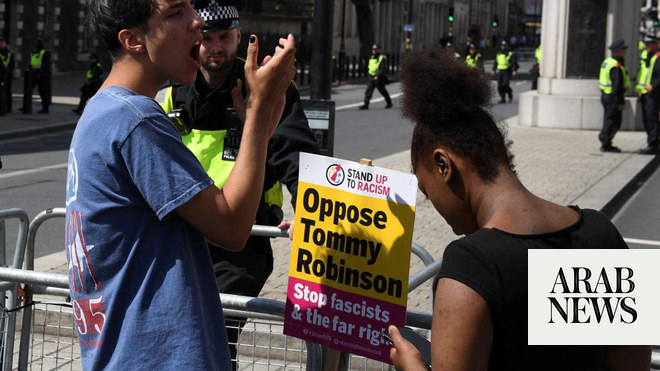DHAKA: Bangladesh police have released from hospital and arrested the leaders of a student protest that sparked nationwide unrest last week when security forces clashed with demonstrators.
Since the beginning of July, students have been demonstrating against a law that reserves most public positions to the descendants of those who fought in the country's 1971 war of liberation.
At least 209 people were killed and thousands injured, according to a tally based on local media reports after protests turned violent last week.
Most of the casualties were recorded in Dhaka, where violent clashes between protesters, government supporters, police and paramilitary troops erupted as the country was left in a six-day communications blackout.
Among the injured were student leaders Nahid Islam and Asif Mahmud, coordinators of Students Against Discrimination, the main organizing group of the protest. They were patients at Gonoshasthya Hospital in Dhaka, from where they were arrested by the Detective Branch of the Dhaka Metropolitan Police on Friday evening. Another student leader who was visiting Islam and Mahmud, Abu Baker Majumder, was also arrested.
Investigation branch chief Harun Or-Rashid told reporters in Dhaka on Saturday that the trio had been arrested “for security reasons” as their families were concerned for their safety.
“We took them into custody to keep them safe,” he said.
The student leaders were arrested by a group of more than a dozen plainclothes officers despite the objections of medical staff, a hospital employee told Arab News.
“Initially, we tried to make them understand that without proper protocols, the admitted patients could not be discharged from the hospital. Later, they spoke to our authorities and the students were taken away from the hospital. There was no way to keep them any longer,” the hospital worker said on condition of anonymity.
“The students’ health was not the best… Asif had low blood pressure and Nahid was suffering from blood clots and bruises in different parts of her body. Both needed further treatment.”
The arrests are part of a police crackdown in Dhaka, where a curfew imposed last week remains in place.
Liton Kumar Saha, joint commissioner of Dhaka Metropolitan Police, said 2,284 people had been arrested in Dhaka following protest-related clashes, during which several government offices were set ablaze.
“We are analyzing the footage from different places and identifying the evildoers. When we get confirmation of someone's involvement in the anarchy, we conduct operations to arrest them. It is being conducted transparently and we are checking the people involved in the sabotage,” he told Arab News.
“In the last 24 hours, 245 people have been arrested in Dhaka. Our push will continue until the situation returns to normal.”
International human rights groups have repeatedly expressed concern over Bangladesh's handling of the protests. Amnesty International said eyewitness accounts and video and photographic evidence “confirm the unlawful use of force by police against student protesters.”
The protests erupted after the High Court upheld a controversial quota system, under which 56 percent of civil service jobs were reserved for specific groups, including women, marginalized communities and the children and grandchildren of freedom fighters, for whom the government reserves 30 percent of the posts.
Last week, the Supreme Court scaled back the quota system, ordering that 93 percent of government jobs be filled based on merit.
